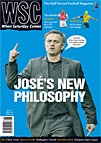 In the light of recent events, Italy will introduce a stewarding system. Matthew Barker reports on how a new approach to stadium management, imposed from above, will impact on the game
In the light of recent events, Italy will introduce a stewarding system. Matthew Barker reports on how a new approach to stadium management, imposed from above, will impact on the game
The day after Manchester United’s Champions League quarter-final first leg in Rome, a series of crowd-control measures were announced by the Italian government. Central to these new laws, drawn up in the wake of the riots in Catania and the death of police officer Filippo Raciti, is the introduction of a stewarding system, modelled on the British matchday experience.
Policing inside stadiums will be phased out in time for the start of next season, with one steward in place for every 250 spectators. A carabinieri presence will remain outside grounds, providing any necessary back-up. Clubs will have to pay new stewarding staff, but the government are funding a training programme for around 70 chief stewards, to be held at a sports college in Rome early this summer. The Italian football federation (FIGC) are also to appoint a national stewarding co-ordinator.
Sports Minister Giovanna Melandri is confident that the changes will run fairly smoothly, but just what actual remit the stewards will have remains unclear. Clubs looking to recruit stewards have pushed the “fun” angle; a way to get out of the house at the weekend and develop a closer affinity with your local side. A journalist from the news magazine Panorama was alarmed by the apparently lackadaisical approach of some of the new employees at Genoa’s Stadio Luigi Ferraris towards their jobs. One interviewee breezily admitted he was there to catch a game for free and socialise with his mates. Fair enough – on a meagre €10 per match, who can really blame him?
With no legal powers, stewards can’t intervene if trouble should break out or if a lone spectator should run on to the pitch, and appear to be little more than ticket inspectors. But what happens when there’s a disturbance in the curva or racist chanting? Stewards surely can’t be expected to go where even the police generally fear to tread. Melandri and the FIGC tend to skirt around the question, issuing rather vague statements hoping that a refound family audience will dilute the more poisonous atmosphere drifting down from sections of the stand.
There is a reluctance for any direct confrontation. Instead, the new laws will steadily chip away at curva culture. Some banners, the celebrated striscioni that drape over whole stretches of terracing, now have to be approved by clubs before they can be displayed in the ground. Forms have to be filled out, detailing the size, content and where in the stadium the banner will be placed. In Turin, fans have compiled photo albums of the striscioni they hope to use throughout the season. Tickets for away supporters can no longer be purchased en bloc, restricting the numbers of travelling support. Previously, ultra groups would buy up tickets and distribute them themselves.
Melandri is aware that any new laws can only really work if the clubs actually own their grounds and (shades of Thatcher here) is keen to put the burden on football to put its own house in order. Italy’s failure to land the 2012 European Championship put a serious dent in clubs’ hopes of gaining ownership on the (relative) cheap. And, while the rich usual suspects should be able to foot the bill comfortably for much needed stadium improvements, with a collective TV rights deal at least a couple of years away, smaller clubs are bound to struggle.
An increase in ticket prices looks likely and the FIGC have spoken of their desire to develop season-ticket sales. We may well have seen the heyday of curva choreography. However, many Italians now feel the ultras have had it their way for too long. The mood following Raciti’s death has been compared to that in England after Hillsborough: a feeling that things have to change, even if it proves to be at the expense of atmosphere and spectacle within grounds.
The Premiership remains very much the ideal, with stewards increasingly seen as symbols of this new calcio moderno. The incidents in and around the Stadio Olimpico, and subsequent political fallout, pushed the flaws and potential problems of the new system under a harsh spotlight, but both the Italian footballing authorities and government are looking to the long term. With so many ultra groups highly politicised and organised, further flashpoints in the short term are probably inevitable.
From WSC 244 June 2007. What was happening this month